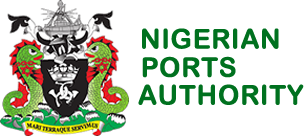.Rolls Out More Infrastructure Development Agenda.

There is no doubt that the Nigerian Ports Authority (NPA) is saddled with the role of managing Nigeria’s seaports through which over 75 percent of imports and exports pass. In this report Ugo Amadi shares the commitments of the Managing Director, Mohammed Bello Koko in steering the ship in last 100 days in office.
All over the world the most common mode of transport in international trade is sea transport, this is as a result of the large amount of cargo that is transported on sea. There are more than 2000 seaports around the world, from the ones with a single berth location handling a few hundreds tons of cargo annually to huge facilities handling about 300 million tons of cargo a year.
More than 80 per cent of trade with origins or destinations in tonnage is water-borne. Ports are emerging more and more into service providers in the execution of trade and the movement of cargoes. This is aimed at enhancing the trade environment and making optimum use of port’s facility.
Smooth flow of maritime cargo not only contributes to greater development of world trade but also seeks to raise the standard of living of the people in whose domains these ports are located. In developed countries, maritime freight cost has been observed to be decreasing in recent years. However, the bulk of maritime freight cost still remains relatively high in developing countries. In most developing countries such as Nigeria, transport cost constitute about 35 per cent of the landed cost of products. Apart from these costs, port service such as speed, reliability, frequencies, safety and security are of increasing concern.
The above is as a result of inefficient maritime and port operations and other issues such as management, logistics and low technological inputs in these ports, giving rise to high over-head cost and low productivity level.
After years of neglect and inconsistent government policies, the current management of the Nigerian Ports Authority (NPA) has invested in equipment and infrastructure to ensure Nigerian ports are efficient and competitive.
Even though a blend of corruption and cronyism rendered ineffective what is one of the most critical agencies of government as revenue generating organ and gateway to the nation’s economy”. Short changing the government had been the norm by various stakeholders but this is fast becoming the past rather than the norm, thanks to the NPA Management team in recent times
Since July 2016, NPA has been going through positive transformations, reforms and repositioning such that its services could well be said to be of international standards. With the coming of the coming of Mohammed Bello Koko who has pledged his commitment in sustaining the transformation agenda in the nations ports , he is working towards repositioning NPA .
Speaking at the assumption of office Koko assured that the management under his watch is working towards repositioning the nation’s seaports and the authority for greater efficiency, safety and accountability.
According to him the authority is currently poised to creating and sustaining competitive advantage by offering best –in class Port operations with a view to ensuring growth, competitiveness and future readiness of the nation’s seaport systems, which he described as germane.
He further disclosed that as part of efforts to position the agency towards greater efficiency, safety and accountability, the management has outlined factors that would enhance such prospects as well as capacity to garner greater market share; which include infrastructural renewal and expansion, the introduction of barge operations and the automation of truck transit through the electronic call up system.
Others include improvement in the sources of revenue and collection, plugging income leakages and reducing overhead costs, elimination of monopolistic conduct, formulation and implementation of policies aimed at incentivize patronage of the Eastern Ports and encouraging competition.
The management is also keeping up with the dictates of Consolidated Revenue (Fund) and Fiscal Responsibility Act, compliance with international best practice, elimination of red tape, boosting workers’ morale and capacity building, among others
Also, part of activities to mark his 100 days in office, the NPA Boss rolled out more infrastructure development agenda.
Bello-Koko also dismissed report of an imminent collapse of the Port, pointing out that remedial integrity and remedial works have been carried out on all the quays.
Bello-Koko said: “I have read and hear people saying that the Tin Can Island Port is collapsing, let me say it here that there is no imminent collapse of the port. Yes, there are defects when it comes to the quays, but there have been remedial works.
“But we are now taking immediate action and we need to go to the FEC for approval, we even have to advertise but we need to get the final design so that things will be properly done because we do not want a haphazard job, so we must get it right from the onset.
The NPA Boss, who spoke on an Arise Television Interview explained that NPA requires $600million for a holistic reconstruction of the Tin Can Island Ports Complex.
He admitted that the Tin Can Island Port has reached its life circle and therefore needs total and holistic rehabilitation.
According to him, after extensive consultations with the terminal operators, it was agreed that a holistic design of the new port should be made as against the option of allowing terminal operators to individually reconstruct their berths and terminals.
He disclosed that the option of embarking on a holistic reconstruction was reached given that not all the terminal operators have the financial capacity to embark of such huge project and that if they are allowed to do it individually at their own time, it might impinge on the integrity of the quays, which would not pay on the long run, thus the decision to opt for total and complete reconstruction.
On funding the project, the first, according to him, is for the NPA to provide the entire funding, which current estimate has put at over $600million or alternatively get some multilateral funding agencies to provide a certain per cent of the funding while the NPA provides the rest.
“We have been proactive to have first of all, started looking for funding options. We have started discussions with multilateral funding agencies that could fund the reconstruction of the port. The other option is for us to approach the Federal Government to request that NPA be allowed to use a certain per cent of the funds it transfers to the Consolidated Revenue Fund CRF for the reconstruction.
“We transfer about N60billion on a yearly basis and so the government could approve that we use 40per cent or 50per cent of this amount for the reconstruction. We actually believe that we do not need to borrow to fund this project.
“Another option is to do a hybrid funding whereby the terminal operators would fund this reconstruction, but the issue here is that while some terminal operators could have the financial strength to carry out the project, others might not and if we allow them to do it individually, it might affect the integrity of the quays.
“So this has to be properly coordinated and we are working with the Federal Ministry of Transport on the decision to be taken and it has to be taken at the right time and properly so that we will have to go to the Federal Executive Council FEC for the approval”.
Bello-Koko, who thanked the management and entire staffers of the organisation, noted that the modest achievements recorded in the last few months could not have been possible without their support and cooperation.
The NPA Boss also noted that going forward, the management would focus on staffers’ welfare, port automation through the Port Community System, strengthening of the electronic call up system for trucks and other articulated vehicles by eliminating monopoly as well as enhancing multi-modal transport in the movement of cargo by streamlining the operations of the barges through its new Standards Operating Procedures SOP, among other pressing issues.
As at today the Nigeria Ports Authority (NPA) is currently undertaking several strategic actions and investment moves to establish a completely digital ecosystem at all the port sites in the country. According to the NPA, this would help to promote smart port transformation with a focus on creating a paperless, time and cost-saving port operations. Needless to say, the benefits of digitalizing the nation’s port system cannot be overemphasised.
Nigeria currently has six seaports: Apapa and Tin Can in Lagos State, Onne and Port-Harcourts in Rivers State, the Warri Port and the Calabar Port, but despite boasting of these ports, only the Lagos ports are operating near full capacity. The Apapa and Tin Can Ports account for 70 per cent of imports on average as NPA data shows that the Onne port handled 80 per cent of Nigeria’s export cargoes between 2012 and 2017.
In a bid to drive its digitalization port operation drive, Bello-Koko said the NPA digital infrastructure deployment strategy is out to ensure that the ICT deployment is aligned to the immediate and future business plan / strategy of NPA.
“This is because we strongly believe in the idea that “digital technology is a means and not an end.” You need to redesign, re-engineer, simplify, harmonize and standardize its business processes, strengthen and streamline the Internal Business Processes (IBP) to support ICT deployment, phase ICT deployment geared towards achieving a fully integrated system with support for integration and to foster relationship with all internal and external stakeholders, deploy fit-for- purpose, reliable, secured and redundant software, network and hardware infrastructure.
“The strategy would also focus on ensuring the ICT deployment support and guarantee disaster recovery and business continuity, taking advantage of emerging technologies like cloud technology, Internet of Things (IOT) and Software Defined Network (SDN), ensure that NPA team (technical and functional users) are continuously trained to acquire the skills required to provide support to digital infrastructure deployments and strengthen ICT governance and project implementation practices, “Bello-Koko stated.
Also, With the successful berthing of MV LADY JANE, a vessel with length overall of 295 metres and draft of 12 metres at the WACT Terminal in Onne Port Complex, the Nigerian Ports Authority (NPA) has again proven its readiness to consolidate on the growth of container vessel traffic in the eastern ports.
The game-changing attribute of this feat is that the vessel, which sailed in from Majuro in the Marshall Islands is discharging 840 TEUS and loading 1,060 TEUS 50% of which are agricultural commodities Cashew nuts, Sesame seed, Cassia Tora seed etc.
This is coming on the heels of the reception at Onne Port of the first ever export-laden barge containing 120 TEUs of Cocoa to Belgium via Cotonou earlier this year.
This is a testament to the unwavering resolve of the NPA to promote exports and support the efforts of the Federal Government of Nigeria at positioning the non-oil sector as a revenue earner.
Although Onne Port Complex has traditionally been known as a logistics hub for Oil and Gas services, the implementation of fresh initiatives deployed by the Bello Koko administration had resulted in a 30% increase in container traffic at the close of the year 2021.
Whilst the historic berthing of the MV Maersk Stadelhorn, a 300 metres LOA container vessel earlier on the 15th of August, 2020 tested the navigability of the channel, MV Lady Jane has proven the capability of the channel for sustained container vessel traffic.
Speaking to stakeholders who came to welcome the vessel which berthed at about 3pm 13th April,2022, the NPA Managing Director Mohammed Bello Koko who was represented by the Port Manager Stanley Yitnoe said that “what this milestone signposts is the fact the initiatives of the Authority geared towards repositioning the eastern ports for productivity are yielding results and that Onne Port Complex is fast becoming an attraction for container vessel traffic. However, we cannot afford to rest on our laurels, we must continually strive to surpass stakeholders’ expectations”.
Also Koko led management is also forging partnerships for better business operation. In Pursuant to the implementation of action points in the Memorandum of Understanding (MOU) between the Nigerian Ports Authority (NPA) and the Lagos State Government (LASG) on truck traffic control and enforcement in Apapa and environs signed on 8th March, 2022, the management of NPA has enlisted the support of the police high command in curbing the activities of extortionists and other forms of illegalities along the roads leading to Apapa and TinCan Island Port Complex.
The Managing Director NPA Mohammed Bello Koko while receiving the AIG Zone 2 Command Bode Adeyinka Adeleke and his counterpart in the Maritime Police Command Ibrahim Kaoje on Thursday 21st April 2022 at the NPA headquarters had lamented the proliferation of illegal checkpoints along the ports corridor and got the consent of the two AIGs to join the NPA management on a spot check of the port access road to ascertain the reality on the ground.
Further to this, a special mobile court has been assigned by the Lagos State Government to assure speedy dispensation of justice and fast track the prosecution of persons arrested perpetrating acts of extortion, unauthorized collections, illegal checkpoints or any other unwholesome practice inhibiting the ease of doing business around the ports.
It will be recalled that previous efforts at curbing the acts of extortion being aided and abetted by uniformed men and other officials of government had been hampered by issues of jurisdictional overlaps between the Ports Authority Police Command (PAPC) and the Lagos State Police Command.
With this partnership between the NPA and the two Police Commands whose jurisdiction covers the Lagos maritime logistics ring, it is expected that those conducting business in the ports will heave a sigh of relief.
























